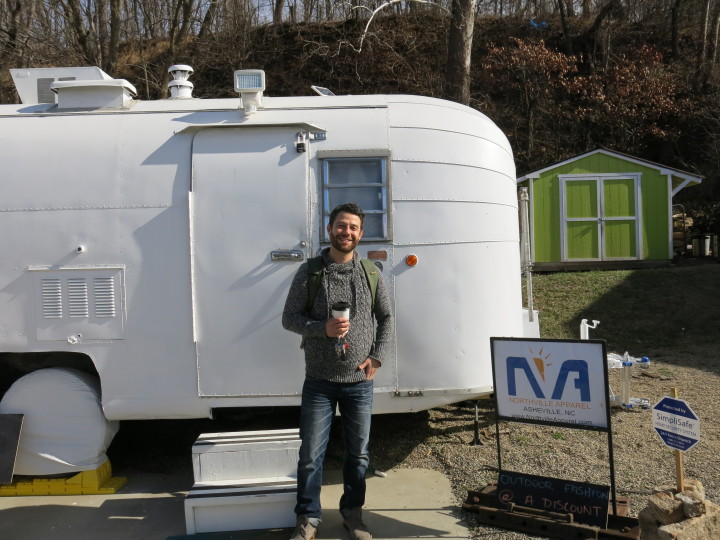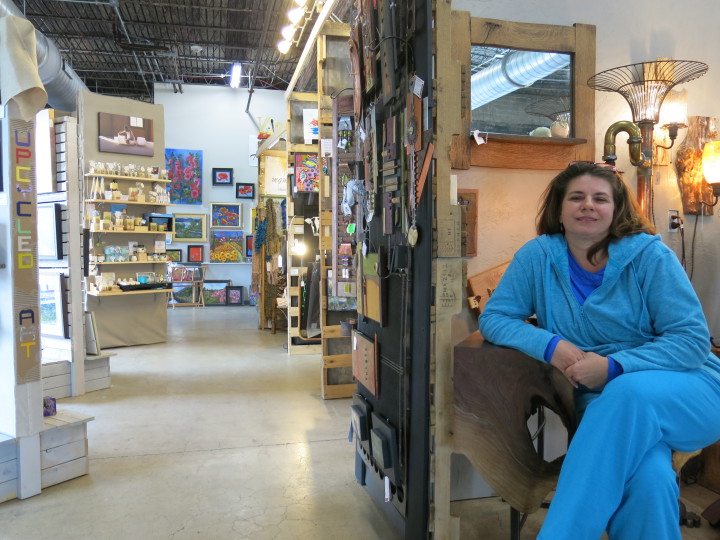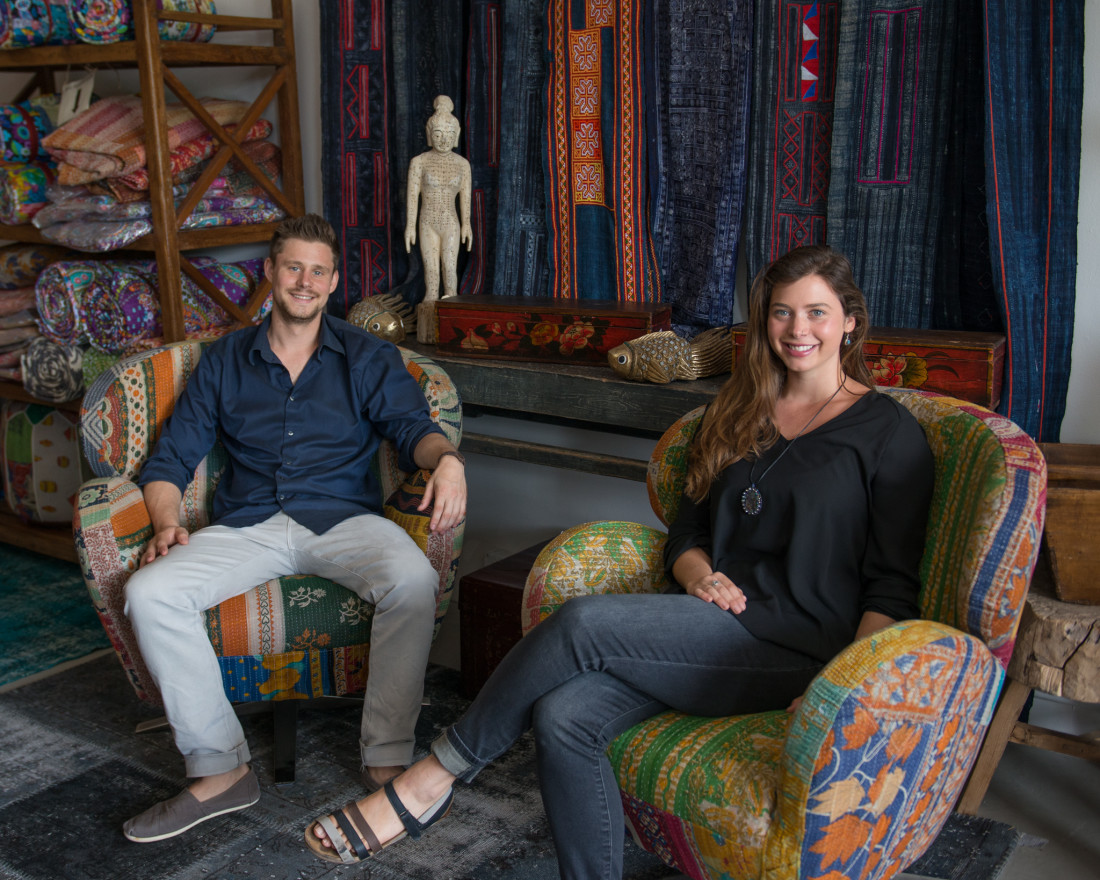When you think of Asheville’s River Arts District, what comes to mind are probably things like painting, sculpture, pottery, glass blowing — you get the drift. But as the neighborhood continues to expand and evolve, new businesses are also popping up. In the last six months, a number of retail shops have opened in the district. Xpress met with the owners of three of these newbies to discuss the challenges of developing a business while surfing the changes in a rapidly evolving area.
Deals on wheels
“My story is a little weird,” says David Kopelman of Northville Apparel, which is housed in the Avion trailer parked alongside Pink Dog Creative on Depot Street. The business, which buys overstocks, overruns, samples and surplus clothing and offers them at wholesale prices, specializes in fashionable outdoor attire. Kopelman describes it as clothing you can hike in during the day and continue to wear downtown at night.
The shop opened in December, and for Kopelman, being there still feels surreal at times. The Asheville native spent his youth playing hide-and-seek in the abandoned buildings that now anchor the River Arts District. As teenagers, he and his friends would walk the railroad tracks, stacking quarters on the rails and kicking the empty beer cans that littered the ground. “If you had told me I’d being doing this then, I would have told you you’re crazy,” he says.
In 2002, Kopelman left Asheville to study finance at UNC Wilmington. He envisioned working as a stockbroker in New York City. “But I ended up getting really sick,” he explains. For six years, doctors misdiagnosed him. Some thought he suffered from depression; others tested him for diabetes. In 2009, the cause was finally discovered: Lyme disease. “My brain stopped working,” says Kopelman.
The illness led him home. And as he convalesced, Kopelman worked in e-commerce, selling clothing among other things. The online business model, however, wasn’t for him. “People think working from home is the ideal lifestyle,” he says. “But it drove me crazy.”
As his health improved, Kopelman began peddling some of his product at outdoor events like Goombay and the Mountain Sports Festival. He enjoyed his interactions with shoppers, but he didn’t want a traditional brick-and-mortar store.
Since buying the Avion last August, Kopelman has had his share of setbacks — a process he calls “paying the ‘stupid tax.’” For a first-time business owner, he maintains, the key is learning from these inevitable mistakes. Another component is recognizing and applying insights gained from other experiences. Kopelman says his e-commerce days provided an invaluable introduction to the industry; he also continues to research and develop relationships with outdoor clothing brands in order to expand and improve his niche market.
Some setbacks have been beyond his control. A week after opening, Northville Apparel suffered a break-in. Product was stolen, and the interior was vandalized, forcing a temporary shutdown and a revamp of the trailer’s security measures.

Since July, there have been 15 burglaries in the RAD, according to statistics provided by the Asheville Police Department. “Like anything else, as the area becomes more desirable for business, it also becomes more desirable for thieves,” notes APD spokesperson Wallace Welch.
He recommends installing an alarm system, proper lighting and video surveillance, with conspicuous signage telling would-be thieves that these measures are in place. Beyond that, keeping inventory up-to-date (including serial numbers) is “the best way to assist police with the recovery of their product,” says Welch, adding that if serial numbers aren’t available, product photos also help.
The robbery is still under investigation. Meanwhile, Northville Apparel is also ironing out legalities with the city. At present, the shop has a temporary permit that allows it to stay at a single location for only 180 days a year. Kopelman says he’ll need an amendment to the current zoning ordinance in order to remain at Pink Dog year-round.
Nonetheless, Kopelman is optimistic about his business’s future in the district. He’s also pretty busy. “You’re looking at the janitor, the repair guy, the CEO, the sign maker, the everything,” he says. “I wear all the hats.”
All in the family
At the other end of Pink Dog Creative sits Sunnyside Trading Co. The family business specializes in furniture and bohemian home décor. Siblings Charlotte and Will Hough opened the shop last July. “Since then, we’ve been teaching ourselves how to run a business,” Charlotte says.
But if they’re still learning how to operate a retail shop, the furniture business is familiar ground. In the early ’90s, their father, Stuart Hough, moved the family to France to pursue his passion as a dealer in European antiques. “We grew up running around the Paris flea market, helping clients bargain at fairs at 5 in the morning and being little translators,” remembers Charlotte.
In the early 2000s, Stuart’s interests shifted toward midcentury furnishings and bohemian textiles. Charlotte, who’d worked with her father in Colorado, relocated to Connecticut, where they ran a wholesale business. Will remained out West. “Neither of them really enjoyed Connecticut or the wholesale business,” he says. “I kind of joked, if you move somewhere cool, let’s start a family business.”
In October 2015, Charlotte began searching for a new location in earnest. “Asheville never really crossed my mind,” she says. But she and her father visited the city on a whim, and in the window of the Asheville Market Basket, Charlotte spotted a chair she’d sold six months before at a furniture show. “It felt like a sign,” she says.
Since launching Sunnyside, the siblings have continued to sharpen their business acumen. Besides accumulating hands-on experience, they’ve gotten help from the Asheville branch of SCORE, a national nonprofit that pairs veteran executives with budding entrepreneurs. They also participate in 1 Million Cups, a free national networking program.
At the same time, the two are acutely aware of what’s happening in the neighborhood and the need to connect. “We have a lot of intention to get involved with the community as much as possible,” says Charlotte.
Although the shop deals mainly in foreign-made items, both owners are emphatic about soliciting and featuring local work as well. Their current inventory includes locally crafted jewelry, pillows, purses and aromatherapy supplies, and they’re always on the lookout for ceramics, candles and soaps. The River Arts District, Charlotte notes, “is gentrifying quickly, and we know that we’re part of that.”
Creating cohesiveness
Farther down Depot Street, in the former Glen Rock Hotel, is the Eco Depot Marketplace. The gallery, which opened on Labor Day weekend, features more than 50 works by local and regional artists and crafters. Those pieces range from paintings to sculptures, furniture to candles, pottery to lamps. The unifying theme is environmental consciousness, whether it’s expressed through materials, techniques or subject matter.
“It helps create a cohesiveness,” notes owner Shelley Schenker, who’s also an artist. And when people come in, she says, “They want to find a reason to buy something, because it’s such a great concept.”
Still, the idea didn’t come from some grand plan. Originally, says Schenker, she leased the space intending to turn it into studios for herself and four other artists. Pretty quickly, though, “We realized it was going to take a lot more people to make this work, to be able to pay the bills. So the business model morphed. … The universe said, ‘You may make your plans, but I am going to laugh at you and show you the direction you really need to take.’”

Although the gallery has only been around for a few months, Schenker has been in the RAD since 2008, in a space in Warehouse Studios; she’s had a front-row seat for watching the district evolve. And because the building Eco Depot is in is among the more recently renovated spaces, she says, many residents are only now discovering it. “It got to the point where locals didn’t even come down this street,” she says. “Or they’d come down it with blinders on, and they’d suddenly go, ‘How long have you been open?’”
Like the RAD, Schenker finds herself in transition — in her case from artist to artist/business owner. “For the next couple of years, my focus can’t be my personal art,” she explains. “That has to take a back seat … because all my creative energy is going into this space, making sure I’m trying everything I can to bring people here to see what my community of artists has to offer.”
It’s a continual learning process, she says, and like Charlotte and Will at Sunnyside, Schenker has sought business counseling through SCORE. Her advice to those who are just starting out — whether it’s in the RAD, greater Asheville or beyond — is to seek out guidance and take advantage of what their particular community has to offer. “That has proven invaluable to me,” she says. “It’s taken me to an upper level: I’m inspired.”



I like these business stories. I like the writer’s style too. Notice he spent some time at UH. Same here.